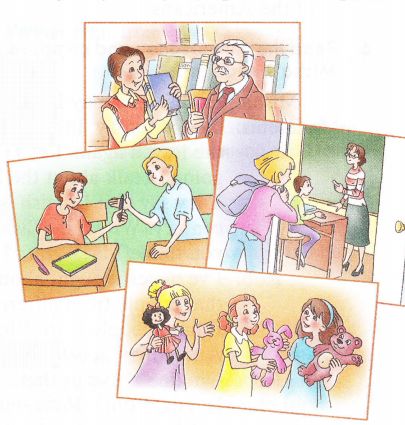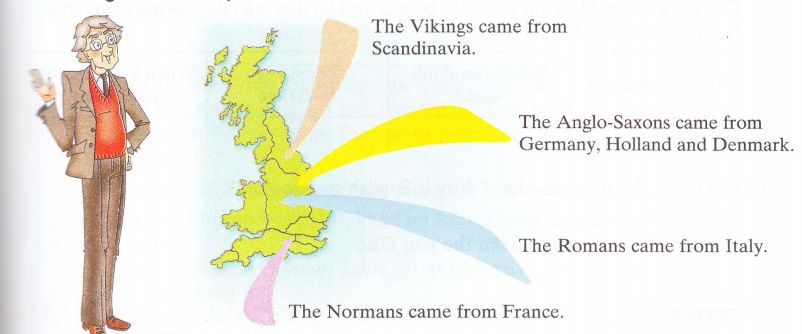|
Гипермаркет знаний>>Английский язык>>Английский язык 8 класс>> English is the Latin of the 21 st century. Grammar Модальные глаголы

Модальные глаголы can, could, may
Для выражения разрешения и просьбы употребляются модальные глаголы can, could и may. Например:
Can I help you? — Можно, я помогу вам?
May I ask you a question? — Yes, you may. — Позвольте задать Вам вопрос? — Да, пожалуйста.
Could / Can you tell те where the bus stop is? — He могли бы Вы сказать мне, где автобусная остановка?
Обратите внимание, что в данном случае существенной разницы в употреблении саn и could нет. Could традиционно является более вежливой формой обращения.
Разница в употреблении модальных глаголов сап и may в значении просьбы и разрешения
Саn употребляется при неформальном общении.
May употребляется, когда беседа носит более формальный характер. Сравните:
May I ask you a question? — Позвольте задать Вам вопрос? (обращение к учителю)
Can I take this book? — Можно я возьму эту книгу? (обращение к другу)
1 What is happening in the pictures? Match the questions with the answers and make up short dialogues about the pictures.
a) May I come in?
b) Can I use your реп?
c) Can I play with you?
d) May I read this book at home?
1. Sure, no problem.
2. No, I'm afraid, you can't. It's very old.
3. Yes, you may, but don't be late again
4. Oh, please. It'll be more fun.

2 Translate the sentences into English.
1. "Вы позволите Вам позвонить?" — "Да".
2. "Можно пойти с Вами в кино?" — "Да".
3. Не могли бы Вы сказать мне, где находится улица Кирова?
4. Я не разрешаю (тебе нельзя) играть в футбол.
5. Я знаю, что мне можно пользоваться этим телефоном.
3 Listen to the words and expressions and repeat them after the speaker.
they say — говорят
plural — множественное число
gender — грамматический род
several — несколько
to contribute to smth — вносить вклад
a contribution - вклад
to interrupt smb / smth — перебивать, прерывать
formation — формирование
such as — такие, как
4 Look through the text of Ex. 6. Наидите предложения с глаголом may.
К кому они обращены? Найдите предложения с глаголом сап. В каком значении использован глагол сап в этих предложениях?
5 Choose the correct answer: Why do people call English the Latin of the 21st century? Several answers can be correct. Think of your own answer.
1. Because it is as easy as Latin.
2. Because it is as popular nowadays as Latin was hundreds of years ago.
3. Because it is the language of the most powerful country in the world. Latin was the language of the Romans, and English is the language of the Americans.
6 Read the conversation and compare you answer with Misha's and Jim's.

Misha: Excuse me, may I come in?
Mr Grams: Yes, you may, Inin. But please don't interrupt the lesson again. Let's start. Today we are going to talk about the English language. They say that English is the Latin of the 21st century. Why is English so popular? What do you think, MacWizard?
Rob: I've never thought about it. I have always taken it for granted that people from different countries understand me.
Jim: I think people learn English because the Americans speak it. And America is the biggest country in the world.
Rob: Oh, don't give us that! There are a lot of big countries such as Russia, China, India, but not so many foreigners speak Russian or Chinese.
Misha: Can I say something now? I think it's popular because it's easy.
Jim: Do you really think so?
Misha: Yes, I do and I can prove it. Let's compare English with Russian, for example.
Plurals are easier. You just have to add an -(e)s in the end. Compare: Tables, books, trees.— Столы, книги, деревья.
Genders are simpler. In English you use "she" for women, "he" for men and all other words are "it". In Russian we have tree (it), table (he), book (she), room (she). It's very difficult.
English words don't change so much.
I read this book every day. — Я читаю эту книгу каждый день.
We read this book every day. — Мы читаем эту книгу каждый день.
You read this book every day. — Ты читаешь эту книгу каждый день.
They read this book every day. — Они читают эту книгу каждый день.
Не (She) reads this book every day.— Он (Она) читает эту книгу каждый день.
You read this book.— Вы читаете эту книгу.
Mr Grams: I think that's very true. English isn't a difficult language. And another thing: several European languages contributed to the formation of English. Can you tell me which?
7 Answer Mr Grams' question. Which European languages contributed to the formation of English? Look at the pictures for help.
8 Listen to the speaker and check your answers: Which language contributed to English the least / the most?

9 ln groups. Find moгe things that are moгe diffiсult in Russian than in Еnglish. ls there anything that is easier in Russion than in Еnglish? Do you agree with Мisha that it is easier to form pluroas and to use tenses in Еnglish?
Conversation bricks
In a discussion
I agree with you. — Я согласен с вами.
I don't agree with you. — Я с вами не согласен.
I'm afraid that's wrong.— Боюсь, что это не так.
I think so too.— Я тоже так думаю.
That's exactly what I wanted to say.— Вот именно это я и хотел сказать.
Do you really think so? — Вы действительно так думаете?
That's very true.— Именно так.
Yes, but don't you think...— Да, но не кажется ли вам...
I'm afraid I can't agree with you.— Боюсь, что не могу согласиться с вами.
As a rule,— как правило
Could I say something here? — Можно мне здесь сказать?
Could I ask a question? — Можно задать вопрос?
May I interrupt for a moment? — Позвольте мне перебить?
Sorry, but... — Извините, но...
You are right.— Вы правы.
For example,— например
I can prove it. — Я могу это доказать.
10 Copy the table into your exercise books and fill it in with the phrases from the Conversation bricks.
| When you agree
| When you don't agree
| When you interrupt
| When you support your ideas
|
|
|
|
|
|
11 Get ready for the role-play "Why is English so popular?"
• Split into groups of five.
• Take your role cards from the Cut Out.
Homework
A Get ready for a role-play "Why is English so popular?"
К. И. Кауфман, М. Ю. Кауфман Английский язык: Счастливый английский.ру / Happy English.ru: Учебник англ. яз. для 8 кл. общеобраз. учрежд.— Обнинск: Титул, 2008.— 288 с: ил.
онлайн библиотека с учебниками и книгами, планы конспектов уроков по обществознанию, задания по английскому языку 8 класса скачать
Содержание урока
 конспект урока конспект урока
 опорный каркас опорный каркас
 презентация урока презентация урока
 акселеративные методы акселеративные методы
 интерактивные технологии
Практика интерактивные технологии
Практика
 задачи и упражнения задачи и упражнения
 самопроверка самопроверка
 практикумы, тренинги, кейсы, квесты практикумы, тренинги, кейсы, квесты
 домашние задания домашние задания
 дискуссионные вопросы дискуссионные вопросы
 риторические вопросы от учеников
Иллюстрации риторические вопросы от учеников
Иллюстрации
 аудио-, видеоклипы и мультимедиа аудио-, видеоклипы и мультимедиа
 фотографии, картинки фотографии, картинки
 графики, таблицы, схемы графики, таблицы, схемы
 юмор, анекдоты, приколы, комиксы юмор, анекдоты, приколы, комиксы
 притчи, поговорки, кроссворды, цитаты
Дополнения притчи, поговорки, кроссворды, цитаты
Дополнения
 рефераты рефераты
 статьи статьи
 фишки для любознательных фишки для любознательных
 шпаргалки шпаргалки
 учебники основные и дополнительные учебники основные и дополнительные
 словарь терминов словарь терминов
 прочие
Совершенствование учебников и уроков прочие
Совершенствование учебников и уроков
 исправление ошибок в учебнике исправление ошибок в учебнике
 обновление фрагмента в учебнике обновление фрагмента в учебнике
 элементы новаторства на уроке элементы новаторства на уроке
 замена устаревших знаний новыми
Только для учителей замена устаревших знаний новыми
Только для учителей
 идеальные уроки идеальные уроки
 календарный план на год календарный план на год
 методические рекомендации методические рекомендации
 программы программы
 обсуждения
Интегрированные уроки обсуждения
Интегрированные уроки
Если у вас есть исправления или предложения к данному уроку, напишите нам.
Если вы хотите увидеть другие корректировки и пожелания к урокам, смотрите здесь - Образовательный форум.
|













